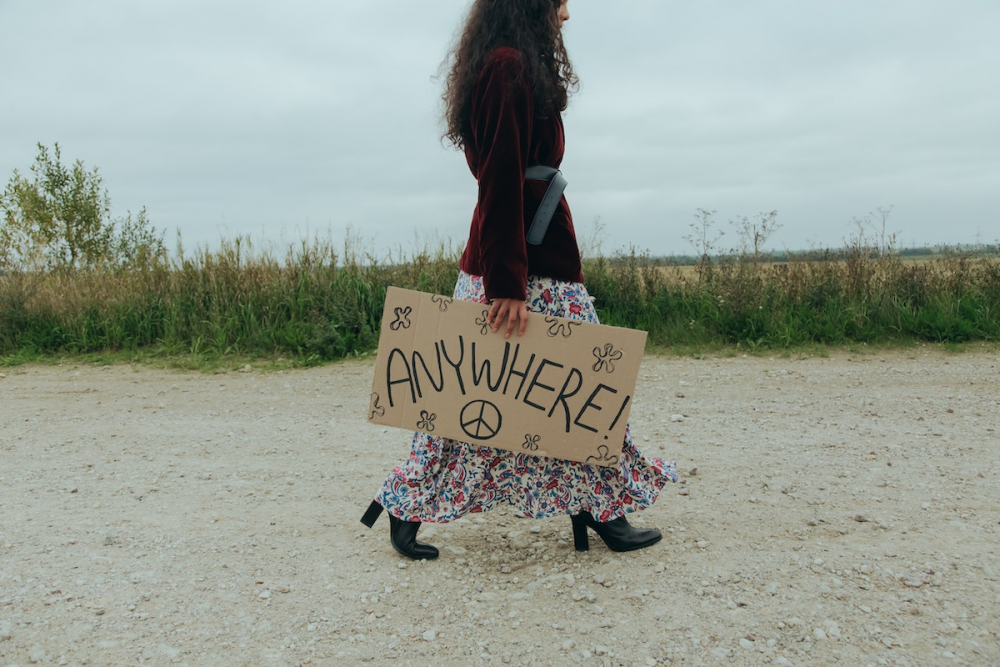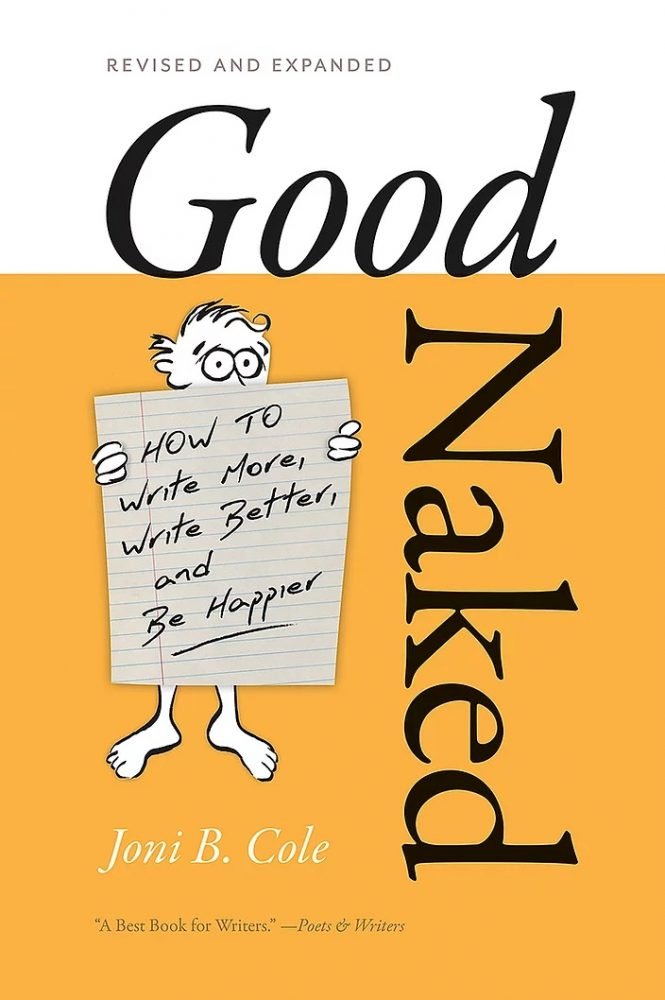
Today’s post is excerpted from Good Naked: How to Write More, Write Better, and Be Happier by Joni B. Cole (@JoniBCole).
You have a Great Idea for a story. You are so infatuated with this Great Idea that you gush to your friends and fellow writers, “I’m going to write a book about [insert your Great Idea here]!” Your Great Idea takes up residence in your psyche. It settles in, as entitled and undisciplined as lesser royalty. Weeks pass, then months, but nothing gets written. Your Great Idea begins to pace the shag carpet of your mind.
“What’s the holdup, hon?” your Great Idea asks. “These shoes are killing me.”
“I just need a little more time,” you tell your Great Idea. “I’m not sure how to get started.”
Life continues, crowding the inside of your head with more experiences, more people, more memories, more distractions: Ticks! When’s the last time I checked myself for ticks? Still, even with so much going on in your world, you keep revisiting your Great Idea in your mind. By now, its shoes are off. Its feet rest on the coffee table of your consciousness, next to a highball sweating on the once burnished cherry tabletop. You think, Why can’t it use a coaster?
“I thought you loved me,” your Great Idea nags. “I thought you were all, like, I want to spend time with you. You mean so much to me. I want us to have a future together.”
And your Great Idea is right. You did want that. You still want that. You loved your Great Idea then and you love it now, only now it is starting to feel more like a love-hate relationship because you cannot think about your Great Idea without feeling guilty. I’m just too busy to sit down and write, you tell yourself, citing your dependents, the crumbs in your bread drawer, your commitment to world peace.
Deep down, however, you know it is not family, or work, or even your ideal of planetary nonviolence that is keeping you away from your desk. This editorial paralysis is all about your fear of making a wrong first move. This is the real reason you cannot commit to your Great Idea.
Where to start? Where to start?
If this scenario sounds at all familiar, you do indeed have a problem. Only it is not the problem you think you have. When launching a novel or memoir—or any creative work for that matter—the issue isn’t that you don’t have a clue where your story should start; the issue is that you think you should have a clue, even before you start writing.
If you are like most writers, and by most writers I mean all but four, the perfect opening for your story will never manifest in your mind. Yes, there is always that one author we have all encountered at a book signing or writing conference who points to his receding hairline and explains to his rapt audience, “I write it all up here, and then just put it down on the page.”
We can admire this author and wish we were like him, perhaps with more hair, but know that this fellow is the exception to the rule, and perhaps not to be completely trusted. Typically, the creative process needs more than a head to sort itself out. Thus, thinking you need to figure out chapter one (or even more distressing, first figure out your preface, then your introduction, and then chapter one) before you start typing away will only succeed in eating up a lot of time, and will make you feel constipated and grouchy.
The good news, however, is that these bad feelings are also what push a lot of people past their reluctance to join a writing workshop, which is at least one productive thing that can come from such misguided thinking. I know my classes certainly attract people struggling with this issue, including Lynne, a professional feature writer who knows her way around a page. Regardless, when Lynne got an idea for a mystery novel about a woman whose teenaged son goes missing after soccer practice, she spent months feeling stuck because she didn’t know where to begin her narrative.
“I have a sense of what I want to happen, but I just can’t figure out the first scene,” Lynne told our group.
“So forget about the first scene,” I advised. “Write any scene you feel fairly certain belongs somewhere in the story. Even better, write the rescue scene where the missing son is discovered alive and well!” I offered this last suggestion because I have little tolerance for authors who kill off children or pets, even if these plot points are in service to the story. Having worked with so many aspiring authors like Lynne—who have gone on to complete powerful stories by following this same advice to start anywhere—I knew this was excellent counsel, from my perspective a no-brainer. But maybe because it is a no-brainer, literally, in that we need to temporarily disengage our brains from its insistence on first things first, this concept is often met with foot stomping.
But I can’t just start anywhere. It feels so loosey-goosey!
I will assume you are thinking this because most people respond to this advice in a similar fashion, at least until they try it. As writers, we may be described as creative types, but that does not mean we don’t like feeling in control, or crave the comfort of structure and predictability as much as the next guy. Human nature does not step easily into the unknown, especially if we think it will cause us more work.
But my book needs a proper beginning!
What book? At the moment, all you have is a feral pig. Perhaps that last comment was unnecessarily harsh, but so many writers tend to try to reduce the creative process to a linear equation because they think that is the proper way to proceed. Listen Great Idea, you are not leaving this head until you tell me where to start! Would that you and your Great Idea could cuddle up in your consciousness together, figure it all out, and then step out onto the page accompanied by a herald of Hallelujahs. No rings on the tabletop. No mess. But messes, you might want to remind yourself, can be fun. They can be the stuff of inspiration. And the reality is, even if the “perfect” opening for your Great Idea does present itself in your mind, it is just as likely to be a false start. By this, I mean that, more often than not, where you think you should start your narrative will actually end up being better suited as backstory embedded in a later chapter. Just sayin’.
Where to start? Where to start?
Shush. Of course, in the end, your narrative needs to open with exactly the right scene, and by exactly the right scene I mean exactly the right scene. For that matter, all the scenes, from the first to the last, must contribute to a flow that establishes not just a chronology but a causality that drives the plot forward and makes readers curious, if not frantic, to know what happens next. Still, none of that needs to be figured out at the front end of writing. And the future structure of your manuscript will not suffer one iota by not writing it from the beginning to the end. In fact, quite the opposite. Starting the creative process anywhere allows you to jump right into a scene, any scene, that demands your attention.
But I don’t want to waste time writing a jumble of scenes without any sense of order.
I imagine this is yet another concern on your mind, which I will counter by asking you this question: How much time have you already wasted not getting any of your Great Idea down on paper? If your answer is, say, six minutes or longer, then I would argue that writing something that might fall somewhere, anywhere, in your story is better than not writing your beginning, which may not even end up being your beginning.
But, but, but …
Shush! I’m sorry to keep shushing you because I know from personal experience how annoying that can be, but you need to quiet your mind and listen to the following good news. I have come up with the perfect writing exercise for people in your predicament! In fact, if you use this prompt to begin your work, I am certain that you will launch your story in the best way possible, and your relationship with your Great Idea will be restored to what it was before both of you did things that you would rather forget.
But …
How do I know this is the perfect exercise to launch your particular Great Idea? I know because it is the same for every writer who has ever felt stuck before even getting started. When it comes to beginnings, saying goodbye is as good a way as any to send us off on our merry way.
“Goodbye. I’ll miss you.” There you go. That is the perfect writing prompt for you, guaranteed. “Goodbye, I’ll miss you.” Just put those words on the page, then keep writing, capturing whatever flows through your fingertips to your keyboard or pen. Write without judgment, or second-guessing, or thinking. Write without worrying about beginnings, middles, or endings. Write now. Right now.
Note from Jane: If you enjoyed this post, be sure to check out the revised and expanded edition of Joni B. Cole’s book for writers, Good Naked.
Joni B. Cole is the author of seven books, including the new release Party Like It’s 2044: Finding the Funny in Life and Death; Good Naked: How to Write More, Write Better, and Be Happier; and Toxic Feedback: Helping Writers Survive and Thrive. For twenty-five years, she has taught creative writing to adults through her own Writer’s Center, as well as at academic programs and conferences around the country. She also runs the Good Naked Weekend Write-Away in White River Junction, Vermont. Find her at: www.jonibcole.com or www.thewriterscenterwrj.com


“What book? …all you have is a feral pig…” What a great line! I’m off to find Joni’s books, which, I bet, never resembled anything like a feral pig!!
That’s my favorite line too!!
Amanda, thanks so much for checking out Good Naked! I hope you find the book useful and a good resource for your own writing clients.
I own this book and return to this section again and again. Highly recommend!!
Great post overall, but 100% worth it just for the comment: “What book? At the moment, all you have is a feral pig.” Definitely making that a wall hanging or email signature!
Mary, thanks so much for your comment on my post/chapter. I love imagining the “feral pig” line on a wall hanging or email signature… or embroidered on a pillow!